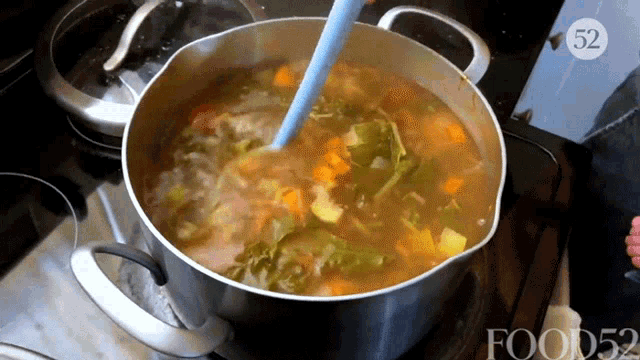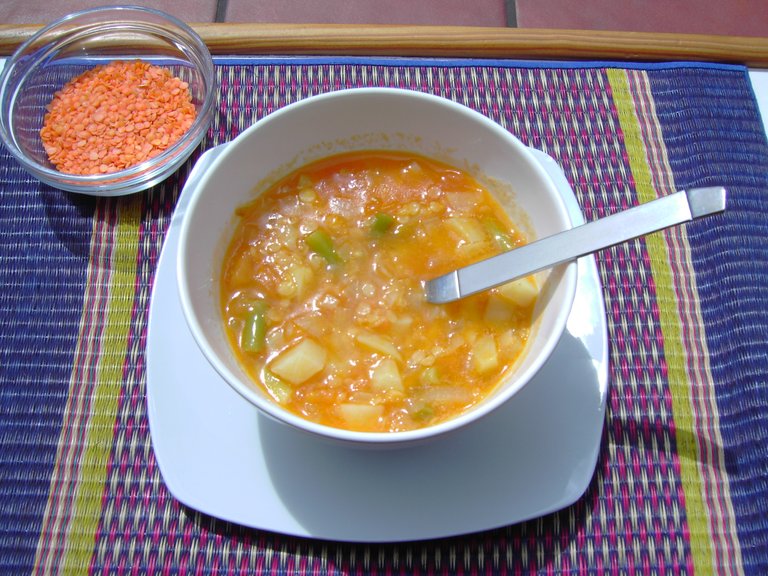Leading a life that can be considered boring, it is understandable that I dedicate most of my daily post to commenting on various topics, such as the anniversaries of #History. For today, I focused on an anniversary in the food area, and it is a holiday that I didn't know existed. Today is 'Homemade Soup Day'.
+++
Llevando una vida que puede considerarse como aburrida, es comprensible que dedique la mayor parte de mi registro del post del día a comentar temas diversos, tales como las efemérides de la #Historia. Para el día de hoy, me enfoqué en una efeméride del área de la #comida, y es una festividad que yo no sabía que existía. Hoy es el ‘Día de la Sopa Casera’.
+++

Image's Source - Fuente de la Imagen
When we seek to find out the origin of the soup, we may be surprised that there is archaeological evidence that traces its roots back to the Upper Paleolithic (between 40,000 and 10,000 years before the present). A time marked by glaciation in which different hominid groups disappeared (Homo erectus, Denisovan hominid, Homo neanderthalensis, Homo floresiensis, etc.), and only the hominid group Homo sapiens remained… Which is us.
I was surprised when I read that archaeological evidence indicates that, to prepare the soup back then, holes were carved in stone into which water and various ingredients were poured, and then pebbles were heated in bonfires, and then dropped into the liquid. With this procedure, after several hot pebbles, the water cooked the food and the soup was ready. I found this cooking method very creative, and I wasn't expecting it. But, that explains how soup could be made before there was pottery or metallurgy technology. After the development of pottery and metal handling, the first pots appeared, and the technique for soup changed completely.
+++
Cuando buscamos averiguar el origen de la sopa, nos podemos sorprender de que se tienen evidencias arqueológicas que remontan sus raíces hacia el Paleolítico Superior (entre 40.000 y 10.000 años antes del presente). Una época marcada por la glaciación en la que distintos grupos homínidos desaparecieron (Homo erectus, Homínido de Denísova, Homo neanderthalensis, Homo floresiensis, etc.), y quedó solamente el grupo homínido Homo sapiens… que somos nosotros.
Yo me sorprendí cuando leí que, las evidencias arqueológicas señalan que, para preparar la sopa en aquel entonces, se tallaban en piedra unos agujeros en los que se vertía agua y varios ingredientes, para luego calentar guijarros en fogatas, y dejarlos luego caer en el líquido. Con este procedimiento, luego de varios guijarros calientes, el agua cocía los alimentos y la sopa estabas lista. Este método de cocción lo encontré muy creativo y no me lo esperaba. Pero, eso explica cómo se podía hacer sopa antes de que hubiera la tecnología de alfarería o de metalurgia. Luego del desarrollo del manejo de alfarería y el manejo de metal es que aparecen las primeras ollas, y la técnica para la sopa cambia completamente.
+++

Image's Source - Fuente de la Imagen
By the way, I couldn't quite figure out the origin of the holiday. At the very least, I found out that it focused on homemade soup because it is about reclaiming homely food, placing the focus on making healthy food at home and consuming it both for economy and to strengthen emotional and social ties between family members. That sounds pretty good.
Well, I say goodbye, wishing you that you are well and that we can read again another time.
+++
Por cierto, no pude averiguar bien el origen de la festividad. Cuando menos, averigüé que se enfocaba en la sopa casera porque se trata de reivindicar la comida hogareña, colocando el enfoque en hacer comida saludable en casa y consumirla tanto por economía, como para el refuerzo de lazos afectivos y sociales entre los miembros de la familia. Eso suena bastante bien.
Bien, ya me despido, deseándote que tú estés bien y que nos podamos leer de nuevo en otra oportunidad.
+++

This challenge is an initiative of @flaxz
The 4 points to join the #IAmAliveChallenge, includes using the hashtag #alive to post to We Are Alive Tribe and earn ALIVE tokens.
Este desafío es iniciativa de @flaxz
Los 4 puntos para unirte al #IAmAliveChallenge, incluyen el uso de la etiqueta #alive para publicar en We Are Alive Tribe y ganar tokens ALIVE.






